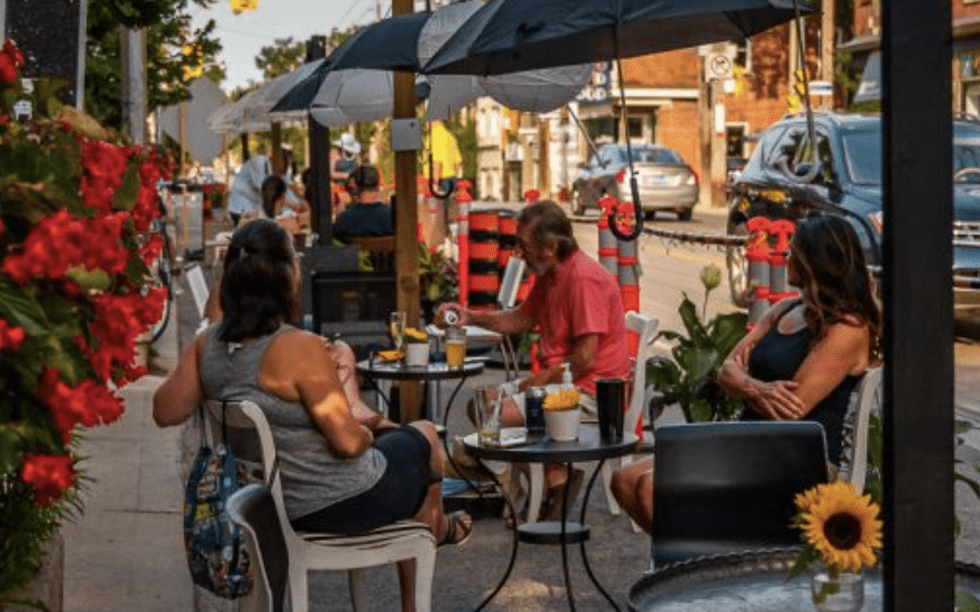Get ready for patio season in the city (some day).
In yet another loud and clear sign that cars are taking a backseat in Toronto’s future, the City has released a report with proposed changes to make its game-changing CaféTO program permanent.
The program, which was adopted in 2020 in response to pandemic restrictions, sees portions of Toronto streets turned into seasonal patios at restaurants across the city. While the program adds more breezy outdoor dining real estate to the summertime equation, some argue that it makes less logistical sense now that an abundance of cars -- and Toronto’s trademark maddening congestion -- has returned to city streets.
The report proposes changes that will advance the transition of CaféTO from a “temporary emergency response initiative,” to a sustainable program that makes Toronto’s streets “more attractive, safe, and accessible,” while continuing to allow restaurants and bars to operate with expanded space outdoors.
According to the City, the proposed changes will ensure that the future CaféTO locations are “beautiful, active, and accessible.” In late 2021, Council approved a plan to transition many of CaféTO’s temporary processes into a permanent program, starting with a return to standard sidewalk café permitting and a streamlined administration and application process -- an effort to quickly make up for lost time and revenue during lockdowns.
At the Executive Meeting on January 31, the report that recommends returning to standard permit processes for all right-of-way café types that were in place before the COVID-19 pandemic will be discussed. The report also includes recommended updates to the outdoor dining bylaw, and recommends the City continue to subsidize permit fees through $1.4M in financial support this year.
The City highlights that it has already dished out more than $20M in funding to CaféTO since its inception. It’s been met with a positive response: a 2022 economic impact study from Toronto Association of Business Improvement Areas, funded by the City, found that the program delivered $203M in economic benefits to Toronto in 2022, and that CaféTO diners spent an estimated $179M on patios from May through September.
Taking into account accessibility, safety near on-street patios, and equitable program access, the report recommends returning to the existing requirements of constructing temporary platforms in curb lane café permit areas. It also recommends a grant program to assist businesses in meeting these requirements.
Most notably -- especially for small business owners still feeling the impacts of the pandemic -- the report advises reinstating the one-time application fee of $865, and updating permit fees for curb lane cafés and sidewalk cafés across the city. Currently, the City picks up the tab for this program, priced at $1,449 for the average sidewalk cafe and about $3,077 for the average curbside cafe.
“These proposed program changes are designed to encourage co-investment with the City in the program from restaurant and bar owners and to ensure café installations are safe and accessible while supporting the viability of the curbside area,” reads a City-issued press release.
Two grants for small businesses and Business Improvement Areas (BIAs) will continue in 2023, says the City. The CaféTO Property Improvement Program -- fully funded by the Government of Canada -- will match 50% of the cost of eligible patio space improvements up to a maximum of $7,500. Furthermore, the City’s BIA CaféTO grant program will support planter maintenance and curb lane closure design. BIAs are eligible to receive up to $5,000.
In 2022, 1,327 establishments across the city took advantage of CaféTO. Whether this figure will change at all when business owners are asked to dish out dollars remains to be seen.






















